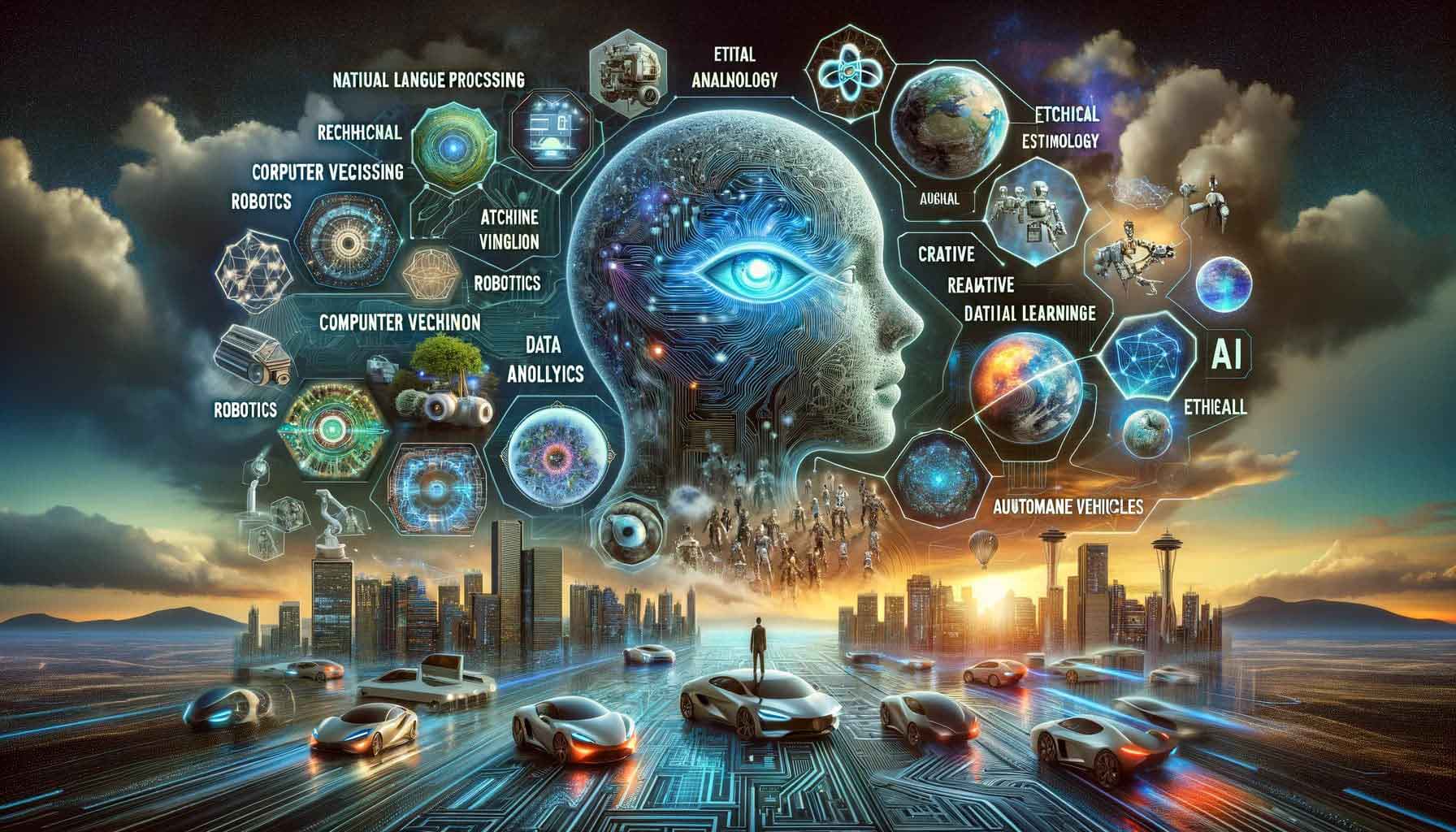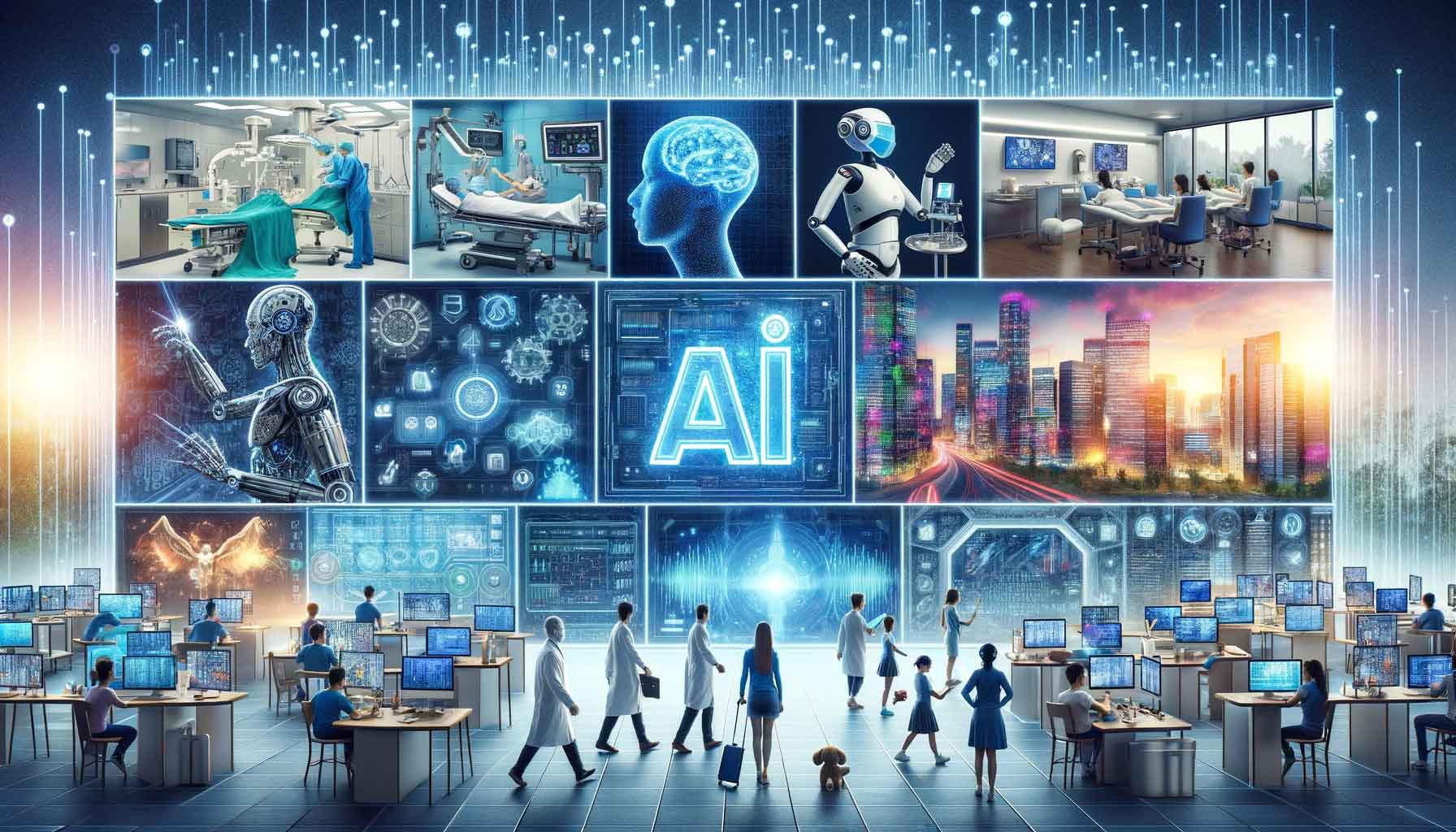The Newest Trends in AI: What’s Shaping 2024

Simple way to 10x boost your productivity in every day tasks
The simplest way to create and write high valuable texts in sedonds that truly resonate with your target audience
Simple way to extract and monitor all the web data of any website in Seconds
Artificial Intelligence is one of the most rapidly growing fields today, with new advancements and groundbreaking technologies emerging at an unprecedented pace. In this article, we explore the latest AI trends that are shaping the year 2024. From industry forecasts to cutting-edge technology, we’ll take a closer look at how AI is transforming our present and shaping our future.
Key Takeaways
- AI technology is constantly evolving, leading to new advancements and emerging trends.
- AI is transforming various industries, and we examine the specific applications in different sectors.
- Ethical considerations, explainable AI, and trust are critical components in AI development and deployment.
- AI is revolutionizing cybersecurity, autonomous systems, and customer experience, among other fields.
- The future of AI lies in collaboration between humans and machines, leading to augmented intelligence and driving innovation.
Advancements in AI Technology
The landscape of AI technology is rapidly expanding, with new innovations emerging constantly. In 2024, the development of AI technology will be driven by a range of advancements in different areas. One of the most exciting areas of development is natural language processing, which enables machines to understand and communicate with humans in a more natural way. Another area of focus is computer vision, where significant improvements are made in recognition and understanding of visual content.
The emergence of conversational AI platforms, such as Siri and Alexa, has greatly improved natural language processing. Researchers have made significant strides in understanding the nuances of human language, enabling machines to interact with humans in a more natural way. In terms of computer vision, the use of deep learning algorithms has enabled machines to recognize and understand visual content with greater accuracy.
“The latest advancements in AI technology are driving the development of AI-powered assistants and virtual agents, which have a broad range of applications across industries.”
Other areas of development in AI technology include robotics, machine learning, and data analytics. Advancements in these areas are enabling machines to automate complex tasks and make intelligent decisions based on data analysis. Furthermore, these advancements are making AI technology more accessible to businesses and organizations of all sizes, driving innovation and accelerating growth across industries.
Emerging AI Trends
As AI technology continues to evolve, there are several emerging trends that are expected to shape its development in 2024. One of the most significant trends is the integration of AI with blockchain technology, which has the potential to revolutionize industries such as finance and supply chain management. Another emerging trend is the development of AI systems capable of generating creative content, such as music and art, which could have a major impact on the entertainment industry and beyond.
Emerging trends in AI technology are also expected to drive the development of AI-powered autonomous vehicles, which could revolutionize the transportation industry. Additionally, as AI continues to become more sophisticated, there will be greater demand for ethical considerations to be integrated into AI development and deployment.
Advancements Driving AI Technology in 2024 Emerging AI Trends in 2024 Natural Language Processing Integration of AI with Blockchain Technology Computer Vision AI-generated Creative Content Robotics AI-powered Autonomous Vehicles Machine Learning Ethical Considerations in AI Development and Deployment Data Analytics AI and IoT for Smart Home Automation Overall, the advancements and trends in AI technology are set to shape our future in unprecedented ways. Stay informed about the latest AI trends and developments to stay ahead in this dynamic and rapidly evolving field.
Industry-Specific AI Applications

The rise of AI is disrupting various industries, transforming the way businesses operate and delivering new, innovative solutions. According to Forbes , the global artificial intelligence market size is projected to reach $1,811.8 billion by 2030. In this section, we will explore how AI is specifically revolutionizing different sectors, from finance to healthcare, and projecting industry-specific AI forecasts.
Finance
In the finance industry, AI is used in fraud detection, risk analysis, customer service, and investment analysis. AI-powered chatbots are enabling faster, more precise responses to customer issues, while robo-advisors are facilitating investment strategies and portfolio optimization.
Healthcare
In healthcare, AI is optimizing treatments and patient care, streamlining research, and augmenting the capabilities of medical professionals. AI-powered robots are assisting with surgeries and diagnostics, while chatbots are improving patient communication and satisfaction. The AI industry forecast in healthcare predicts a growth of $19.25 billion by 2026, according to Markets and Markets .
Transportation
In the transportation industry, AI is improving safety, efficiency, and productivity. Autonomous vehicles are utilizing AI to monitor road conditions, optimize routes, and enhance driver and passenger experience. Smart traffic management systems are using AI to predict and manage traffic flow, reducing congestion and emissions. The AI market trend in transportation is expected to reach $10 billion by 2025, as reported by Allied Market Research .
Retail
In the retail industry, AI is enhancing customer experience, optimizing supply chain management, and improving sales forecasting. AI-powered chatbots and virtual assistants are providing personalized recommendations and customer support, while smart inventory and demand management systems are reducing waste and optimizing inventory. The AI market trend in retail is expected to grow to $19.9 billion by 2027, according to P&S Intelligence .
Overall, these industry-specific AI applications are contributing to the growth and development of various industries across different sectors. As AI continues to advance, we can expect these trends and forecasts to evolve and generate new, innovative solutions that drive progress and innovation.
Ethical Considerations in AI
As the field of AI rapidly progresses towards more advanced technology, the ethical implications of these innovations become increasingly important. It is crucial to address the potential consequences and ensure the ethical implications of AI development and deployment are taken into account. In 2024, AI is predicted to continue to advance at an unprecedented rate, and addressing ethical concerns is becoming an essential aspect of AI applications.
AI and Bias
One of the most concerning ethical considerations in AI is the potential for bias. AI systems learn from large datasets, so the outcomes may favor one group over another, resulting in unfair treatment. Recognizing this concern, various methods have been employed to mitigate bias, including expanding the dataset, implementing oversight, and considering the system’s social context.
AI and Privacy
Another essential ethical consideration is privacy. AI advances rely on a massive amount of data, but personal data must be appropriately secured. Organizations must ensure that data privacy regulations are followed, and data is collected and used transparently and ethically.
AI and Social Impact
The impact of AI systems on society must also be taken into account. In 2024, AI applications are predicted to expand significantly in various fields, including healthcare, finance, and transportation, among others. AI systems may improve efficiency and productivity but may also lead to job displacement. Balancing the benefits and drawbacks of AI on society requires thoughtful consideration of various stakeholders.
“AI is like fire, it can cook your food or burn your house down. It’s up to us to decide how to use it.” – Andrew Ng, AI researcher, and entrepreneur.
Ultimately, responsible development and deployment of AI systems require organizations to address ethical implications. In 2024, aligning AI trends with ethical considerations is essential to ensure a more equitable and sustainable future.
Reinforcement Learning and AI
Reinforcement learning is a critical area of AI research that has garnered significant attention in recent years. This approach to machine learning involves teaching machines to make dynamic decisions based on real-time feedback from their environments.
Reinforcement learning algorithms are driving advancements in AI technology, particularly in areas such as robotics, gaming, and autonomous systems. For instance, researchers are using reinforcement learning to improve the capabilities of autonomous cars to identify and respond to complex traffic situations.
Advances in reinforcement learning are expected to shape the future of AI development and applications in 2024. With reinforcement learning, machines can learn from their experiences, develop new strategies, and improve their performance over time, all without human intervention. This technology has the potential to revolutionize various industries and pave the way for more efficient, accurate, and sophisticated AI systems.
Reinforcement Learning in Action:
| Industry | Application |
|---|---|
| Healthcare | Reinforcement learning is being used to develop personalized treatment plans for patients based on real-time feedback from their bodies. |
| Finance | Reinforcement learning is aiding in fraud detection by identifying patterns in financial transactions that suggest fraudulent activity. |
| Gaming | Reinforcement learning is being used to train gaming agents in complex games, allowing them to develop new strategies and outperform human players. |
As AI continues to evolve, reinforcement learning will play a pivotal role in driving innovation and shaping the future of technology.
Explainable AI and Trust
Explainable AI has become a vital component for building trust and transparency in AI systems. With AI becoming increasingly prevalent in various sectors, it is crucial for individuals to understand how AI works and why certain decisions are being made.
Moving into 2024, advancements in explainable AI are expected to enhance the trustworthiness of AI applications. AI models will be more interpretable and will provide a clear understanding of how decisions were made, allowing for better decision-making processes and improved outcomes.
Explainable AI can also help to identify errors, bias, and unethical decision-making, promoting fairness and accountability. As a result, individuals can trust that the AI system is ethical and unbiased, resulting in more widespread adoption of AI in various industries.
Example of Explainable AI:
“The X Company provides an explainable AI platform that utilizes machine learning algorithms to identify the factors that contribute to a particular decision. The platform provides the user with clear and interpretable insights into the decision-making process, allowing for improved transparency and trust in the AI system.”
AI and Data Privacy
As the AI industry forecast suggests a booming growth, data privacy is becoming an increasingly important issue. With AI relying heavily on data, organizations must ensure that they handle personal information and sensitive data with care and diligence while adhering to the AI future trends.
Trends and Regulations
In 2024, regulations surrounding data privacy continue to evolve, with the General Data Protection Regulation (GDPR) being a significant example of this trend. The trend is set to continue, with the rise of privacy regulations introducing a new layer of compliance and protection frameworks.
Addressing Privacy Concerns in AI Development
Organizations that adopt an AI system or integrate it into their operations must consider the potential impacts on personal privacy. AI developers should prioritize the development of privacy-preserving mechanisms to mitigate concerns and ensure that data accessibility follows the current AI industry forecast. Additionally, maintaining transparency with end-users regarding data usage and provisions for data deletion upon request can serve to build trust and encourage data sharing.
AI in Cybersecurity
As available data increases, cybersecurity concerns grow rapidly. As a result, cybersecurity systems must be more sophisticated and proactive, which is where AI technology comes in. AI-powered cybersecurity systems not only detect known threats, but also have the capability to detect unknown threats and identify suspicious patterns that traditional systems wouldn’t detect.
The continual advances in AI technology will assist and direct the growth of sophisticated applications like intrusion detection, malicious activity detection, and vulnerability scanners. The capability of AI to learn from huge data sets and generate predictive models is also a crucial element in the development of fraud detection systems.
SecurityAutomation and Response (SOAR) platforms that unite Claims management, Security Information and Event Management (SIEM), and Vulnerability Management (VM) are already being empowered by AI technologies. Based on AI-generated insights, these tools can quickly detect and shut down security incidents, saving valuable time and resources.
AI Cybersecurity Predictions for 2024
AI advancement in cybersecurity will continue through 2024 and beyond. AI technology will mature, become more centralized, and assist many various cybersecurity systems. These are the significant trends in cybersecurity and AI technology predicted for 2024:
- AI detection of zero-day vulnerabilities and attacks.
- AI-powered behavioral analytics providing real-time threat assessments.
- AI to monitor and analyze network performance, allowing for immediate and accurate response to both regular and anomalous occurrences.
- Machine learning to extend to scripted attacks, botnets, and other security hazards.
The future of cybersecurity is AI-powered, and 2024 will undoubtedly usher in a new era of cybersecurity for our digital world.
AI in Autonomous Systems
The year 2024 brings a new era of autonomous systems powered by AI technology advancements. Self-driving cars, drones, and robotics are transforming industries and society as a whole, creating innovative solutions to previously unsolvable problems.
The AI market trends 2024 predict that the market will reach new heights, driven largely by the exponential growth in autonomous systems. The use of AI in autonomous systems enhances their decision-making abilities, enabling them to function independently and efficiently.
One example of AI’s role in autonomous systems is the use of computer vision in self-driving cars, which can detect obstacles and adjust the car’s speed and direction accordingly. Drones can be programmed to navigate through hard-to-reach locations to collect data, while robotics can automate repetitive tasks in industries such as manufacturing and logistics.
As the technology continues to evolve, the benefits of AI-enabled autonomous systems will only increase over time. The development of these systems will pave the way for safer and more cost-efficient solutions across various sectors.
AI-enhanced Customer Experience
As AI continues to advance, it is transforming the way businesses interact with customers. From personalized recommendations to chatbots and virtual assistants, AI is paving the way for enhanced customer experiences. According to the AI industry forecast, the integration of AI technology in customer experience will continue to grow in the year 2024.
In fact, many businesses are already taking advantage of AI to gain a competitive edge in the market. Personalized recommendations based on customer behavior and preferences are becoming increasingly common, making online shopping more intuitive and convenient. Chatbots and virtual assistants are streamlining customer service, providing quick and efficient support.
The future of AI-enhanced customer experience looks promising. As AI technology continues to evolve, customer interactions will become even more seamless and personalized. Customers will be able to enjoy a truly immersive shopping experience, with AI-powered recommendations, instant support, and more.
Augmented Intelligence: Humans and AI Collaboration
The future of AI lies in collaboration between humans and machines. Despite fears of job displacement, the reality is that AI augments rather than replaces human abilities, providing support to make our work more efficient and effective. In 2024, we can expect to see continued growth in the use of augmented intelligence, which emphasizes how machines and people can work together to achieve better results.
Examples of Augmented Intelligence
There are many ways AI can augment human activity, ranging from voice assistants that help us manage our schedules, to machine vision that lets doctors make more accurate diagnoses, or to fraud detection systems that identify anomalies more efficiently throughout the quiet analysis of large-scale datasets. As a result, augmented intelligence has the potential to drive innovation in various fields.
Enabling Collaboration
For augmented intelligence to work, machines and people must work together seamlessly. For instance, companies and organizations must create environments that welcome mutual collaboration, rather than pitting human employees versus the technology tools they use. This cooperation leads to a workforce that’s both nimble and empowered, with humans and machines working together to enhance productivity and solve complex problems.
By 2024, experts predict that we will have reached a point where humans and AI are working together to achieve their mutual goals. This cooperation has the potential to save us time, reduce errors, and increase the impact of our work.
We believe that augmented intelligence will play a central role in helping humans and AI collaborate, and drive innovation across various industries in 2024 and beyond.
Conclusion
In conclusion, the rapid pace of advancements in AI technology is opening doors to innovative opportunities in 2024. With industry-specific applications, ethical considerations, and emerging trends such as augmented intelligence, the potential of AI is limitless. As we move forward, it is crucial to remain informed about the latest AI developments and trends to stay ahead of the curve. Let’s embrace these exciting times and collectively contribute to shaping the future of AI.
FAQ
What are the newest trends in AI for 2024?
In 2024, the AI industry is expected to witness groundbreaking advancements and trends. From advancements in AI technology and industry-specific applications to ethical considerations and augmented intelligence, the AI landscape is set to evolve in unprecedented ways.
What are the key advancements in AI technology?
The field of AI is constantly evolving, with cutting-edge technologies shaping its landscape in 2024. Advancements in natural language processing, computer vision, and deep learning are driving the development of AI technology, enabling AI systems to perform tasks with greater accuracy and efficiency.
How is AI being applied in different industries?
AI has transformative applications across various industries. In healthcare, AI is revolutionizing diagnosis and treatment, while in finance, it is enhancing fraud detection and investment strategies. Other sectors like manufacturing, retail, and transportation are also leveraging AI to optimize operations and improve customer experience.
What are the ethical considerations in AI?
As AI advances, ethical considerations become crucial. In 2024, there will be a growing focus on addressing ethical concerns in AI development and deployment. Ensuring transparency, fairness, and accountability in AI systems will be key to build trust and avoid potential biases or negative impacts.
How is reinforcement learning shaping AI development?
Reinforcement learning, a key area of AI research, has garnered significant attention. It involves training AI algorithms through trial and error to maximize rewards. In 2024, reinforcement learning is expected to continue shaping AI, enabling systems to make more informed decisions and adapt to changing environments.
What are the advancements in explainable AI?
Explainable AI focuses on making AI systems transparent and understandable. In 2024, significant progress is expected in developing techniques that provide explanations for AI decisions, enhancing trustworthiness and accountability. This will play a crucial role in regulatory compliance and fostering user confidence.
What are the concerns around AI and data privacy?
AI heavily relies on data, raising concerns about privacy and security. In 2024, organizations will need to address these concerns by implementing robust data privacy measures, ensuring proper data usage and protection. Compliance with evolving regulations and ethical guidelines will be pivotal in maintaining user trust.
How is AI impacting cybersecurity?
AI is proving to be a valuable ally in the fight against cyber threats. In 2024, advanced AI-powered cybersecurity systems are expected to play a critical role in identifying and preventing cyber attacks. AI’s ability to analyze vast amounts of data and detect anomalies enhances the overall security posture of organizations.
How is AI shaping autonomous systems?
AI is instrumental in the development of autonomous systems such as self-driving cars, drones, and robotics. In 2024, AI will continue to advance the capabilities of these systems, enabling them to operate with greater efficiency, safety, and adaptability, ultimately transforming industries like transportation and logistics.
How is AI enhancing customer experience?
Businesses are leveraging AI to provide personalized customer experiences. Through AI-driven technologies like chatbots, virtual assistants, and recommendation engines, companies can deliver tailored interactions and optimize customer satisfaction. The AI industry will focus on further enhancing these capabilities in 2024.
What is augmented intelligence?
Augmented intelligence refers to the collaboration between humans and machines, combining human ingenuity and AI capabilities. In 2024, this collaborative approach is expected to drive innovation across various fields, augmenting human decision-making and problem-solving abilities with AI’s analytical power.
What can we expect from AI in 2024?
In 2024, AI is poised to bring about remarkable changes across industries and society as a whole. With advancements in technology, industry-specific applications, and ethical considerations, AI will continue to shape the future by enabling smarter decision-making, enhancing customer experiences, and unlocking new possibilities.


